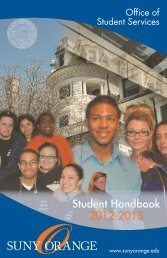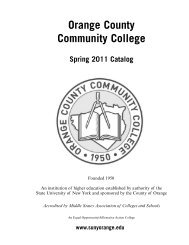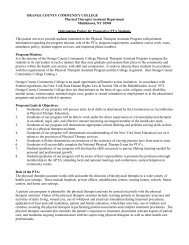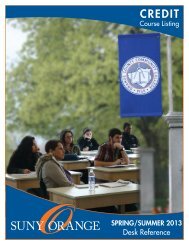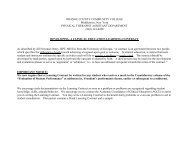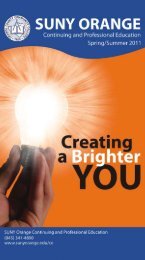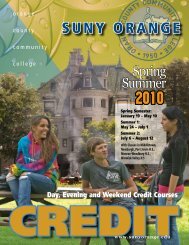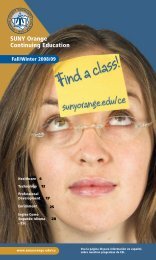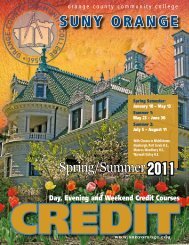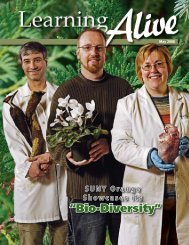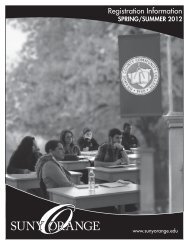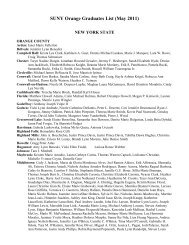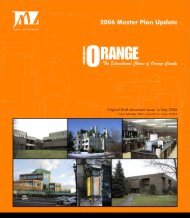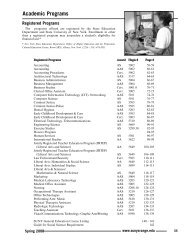You also want an ePaper? Increase the reach of your titles
YUMPU automatically turns print PDFs into web optimized ePapers that Google loves.
Education<br />
partnership, and the multi-faceted role of the early<br />
childhood/childhood professional will be addressed.<br />
The NYS Learning Standards and NAEYC guidelines<br />
will be included. Twenty-four (24) hours of guided<br />
field work at two diverse settings is required. A grade<br />
of B- is required in the JRTEP track. Evidence of<br />
completion of fingerprinting through NYS Dept. of<br />
Education is required.<br />
Prerequisite: ENG 101<br />
EDU 105—Preparing to Teach Young Children<br />
2 cr. (Fall)<br />
This course addresses the skills and concepts<br />
necessary for the classroom teacher of young children.<br />
Emphasis is placed on putting theory into practice.<br />
Such topics as daily schedule, lesson planning,<br />
transitions, balancing individual and small group work,<br />
communication strategies, classroom guidance,<br />
evaluation techniques, and portfolio preparation will be<br />
included. Personal learning and teaching styles, one’s<br />
philosophy of excellent education, and developing as a<br />
professional will also be examined. A grade of C or<br />
better is required to continue and graduate in the<br />
A.A.S./Certificate program.<br />
EDU 107—Mandated Training<br />
1 cr. (Fall/Spring)<br />
This course provides training in both the identification<br />
and reporting of child abuse and maltreatment, and in<br />
school violence prevention and intervention. Intended<br />
primarily for school administrators, teachers,<br />
instructional aides, and child care professionals, other<br />
mandated reporter categories for whom this course may<br />
apply include: all health practitioners, EMTs, foster<br />
parents, social workers, law enforcement, probation and<br />
parole officers, film and photographic print processors,<br />
clergy, firefighters, animal control and humane society<br />
officers, child visitation monitors, and others. Upon<br />
successful completion of the course, students will receive<br />
State Education Department Certificate forms for use in<br />
documenting their satisfactory course work. A grade of<br />
C or better is required to continue and graduate in the<br />
A.A.S./Certificate program.<br />
EDU 109—Fundamentals of Early Childhood<br />
Language Arts<br />
3 cr. (Fall)<br />
This course presents the progressive, interwoven<br />
development in early childhood of the four language<br />
arts: listening, speaking, reading, and writing. Both the<br />
natural processes of language arts development and the<br />
educator’s role in providing a supportive environment<br />
will be discussed. Adaptation suggestions for children<br />
with disabilities, English as an additional language, or<br />
limited literacy experiences will be explored. Learning<br />
appropriate techniques will utilize major authors,<br />
illustrators, and examples of young children’s literature.<br />
A grade of C or better is required to continue and<br />
graduate in the A.A.S./ Certificate program.<br />
Prerequisite: ENG 101<br />
EDU 111—Childhood Health and Safety<br />
3 cr. (Fall, Spring)<br />
Topics include: physical and emotional needs of infants<br />
and children; development of healthy physical selfconcept;<br />
chronic and communicable diseases,<br />
immunizations; first aid; teething and dental health;<br />
accident prevention; recognition and prevention of sexual<br />
abuse; identifying problems and screening techniques for<br />
vision and hearing; nutritional needs, appropriate menus<br />
and meal planning. A grade of C is required to continue<br />
and graduate in the A.A.S./Certificate program.<br />
EDU 201—Observation and Assessment<br />
2 lect., 2 lab., 3 cr. (Fall)<br />
This interactive course combines the observation and<br />
assessment of children, preschool through second grade,<br />
in all developmental areas. By using a variety of<br />
professional techniques and tools during weekly field<br />
work, students will objectively and accurately observe<br />
and record children’s behavior. Corresponding theory,<br />
appropriate practices, environments, and curricula will be<br />
related to field work. Use of NAEYC guidelines will be<br />
included. Twenty-four (24) hours of field work in diverse<br />
settings is required. A grade of C or better is required to<br />
continue and graduate in the A.A.S./Certificate program.<br />
Prerequisite: EDU 101, EDU 102, PSY 101**<br />
EDU 202—Infant and Toddler Development<br />
and Curriculum 2 lect., 2 lab., 3 cr. (Spring)<br />
Study, education, and care of children, pre-natal<br />
through age three, according to basic development<br />
principles and current research will be explored.<br />
Techniques to stimulate cognitive, language, physical,<br />
social, and emotional growth, and to create appropriate<br />
environments, curricula, and care will be studied.<br />
Preparation for the diverse roles of the infant/toddler<br />
professional are included. Guidelines from NAEYC are<br />
used. Thirty-two (32) hours of field work in diverse<br />
settings is required. A grade of C or better is required to<br />
continue and graduate in the A.A.S./Certificate program.<br />
Prerequisite: EDU 101, EDU 102, EDU 111, PSY 101**<br />
EDU 203—Child Care Curriculum Development<br />
and Field Experience 1<br />
3 lect., 6 lab., 5 cr. (Fall)<br />
The student gains experience in early childhood<br />
through supervised participation in local facilities where,<br />
over the course of a year, they take increasing<br />
responsibility in the various roles of early childhood<br />
professionals. In a weekly seminar/lecture, students<br />
discuss their field experiences, and learn to develop early<br />
child education curricula including these areas: Art and<br />
Creative Experiences, Music, Movement, Physical<br />
Activities, Creative Play, Language Arts, Beyond Books,<br />
Discipline and Classroom Management*. A grade of C is<br />
required to continue and graduate in the A.A.S. program<br />
Prerequisite: EDU 101, EDU 102, EDU 111 and<br />
permission of instructor/coordinator**<br />
Corequisite: EDU 201<br />
Spring 2012<br />
www.sunyorange.edu<br />
191



